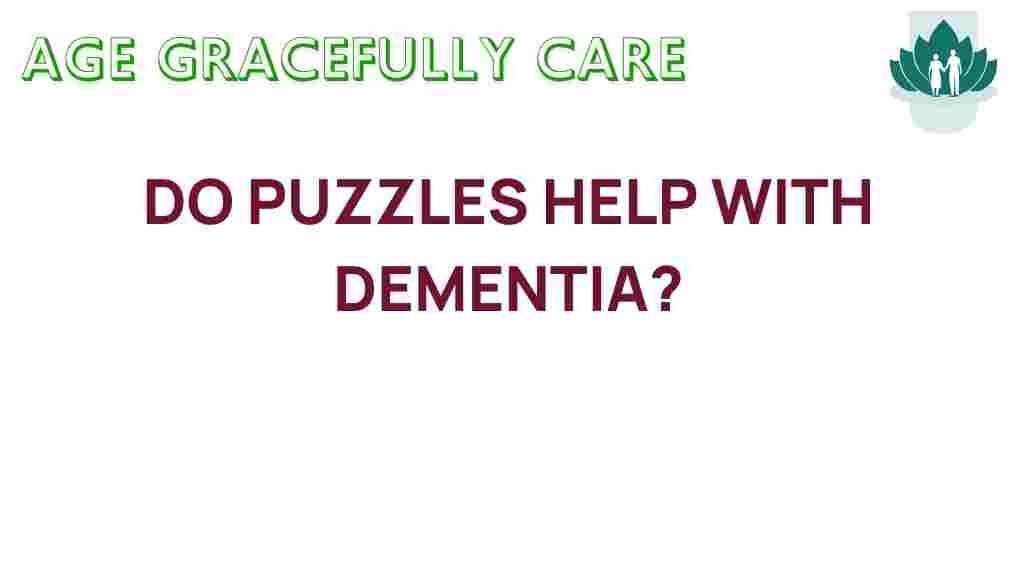Unraveling the Mystery: Do Puzzles Help with Dementia?
The relationship between puzzles and dementia has captured the attention of researchers, caregivers, and families alike. As our aging population continues to grow, the quest for effective methods to maintain cognitive health is more critical than ever. This article explores whether engaging in brain games and puzzles can aid in the prevention or management of dementia, including conditions such as Alzheimer’s.
The Importance of Mental Stimulation
Mental stimulation is crucial as we age. Engaging in activities that challenge the brain can lead to improved memory improvement and cognitive function. Puzzles are one of many therapeutic activities that can provide this stimulation. Here’s how:
- Enhanced Problem-Solving Skills: Puzzles require strategic thinking and problem-solving, which can help sharpen cognitive abilities.
- Memory Enhancement: Working on puzzles can boost memory as individuals recall shapes, patterns, and pieces.
- Social Interaction: Completing puzzles can be a group activity, fostering social bonds that are essential for mental health.
Types of Puzzles and Their Benefits
There are numerous types of puzzles that can contribute to mental stimulation, each offering unique benefits:
- Jigsaw Puzzles: Great for visual-spatial reasoning and can improve cognitive abilities.
- Crossword Puzzles: Enhance vocabulary and verbal skills, important for overall cognitive health.
- Sudoku: Focuses on logical thinking and can improve numerical cognition.
- Logic Puzzles: Great for enhancing critical thinking and problem-solving skills.
Puzzles and Dementia: What the Research Says
Several studies have explored the impact of puzzles on dementia and related cognitive decline. Here are some key findings:
- Research suggests that engaging in activities that stimulate the brain can lower the risk of developing dementia.
- Studies indicate that older adults who regularly engage in brain games and puzzles show slower rates of cognitive decline.
- Activities like puzzles can enhance neural connections and brain function, potentially delaying the onset of Alzheimer’s.
Understanding Dementia and Alzheimer’s
Dementia is an umbrella term that describes a range of symptoms associated with a decline in memory or other thinking skills severe enough to interfere with daily life. Alzheimer’s is the most common form of dementia, characterized by specific changes in the brain. Understanding these conditions is essential for recognizing the potential benefits of puzzles:
- Symptoms of Dementia: Memory loss, difficulty in communication, impaired reasoning, and changes in mood or behavior.
- Alzheimer’s Progression: Early symptoms often include forgetting recent events, which can gradually progress to severe memory loss and disorientation.
How to Incorporate Puzzles into Daily Life
Integrating puzzles into daily routines can be straightforward. Here’s a step-by-step guide to making the most out of puzzle-solving as part of a cognitive health strategy:
Step 1: Choose the Right Puzzles
Select puzzles that are appropriate for the individual’s current cognitive abilities. Start with simpler puzzles and gradually increase the difficulty level as confidence and skills improve.
Step 2: Create a Dedicated Puzzle Space
Set up a comfortable and well-lit area specifically for puzzle-solving. This space should be free from distractions to enhance focus.
Step 3: Set a Regular Schedule
Establish a routine that includes time for puzzle-solving. Whether it’s a daily session or several times a week, consistency is key.
Step 4: Mix It Up
Incorporate various types of puzzles to keep things interesting. Rotate between jigsaw puzzles, crosswords, and Sudoku to provide a broad range of cognitive challenges.
Step 5: Engage with Others
Share the puzzle experience with friends or family. Collaborative puzzle-solving can enhance social interaction, making it a fun and fulfilling activity.
Troubleshooting: Overcoming Challenges in Puzzle Solving
While puzzles can be beneficial, there may be challenges that arise, especially for individuals with dementia. Here are some tips for overcoming these hurdles:
- Frustration: If a puzzle causes frustration, take a break and return to it later. Choose a simpler puzzle to build confidence.
- Memory Aids: Use memory aids like photos or notes to help recall the context of the puzzle, especially for crosswords or logic puzzles.
- Encouragement: Provide positive reinforcement and encouragement. Celebrate small victories to boost confidence.
For further tips on caring for those with dementia, you can explore this link.
Conclusion: The Role of Puzzles in Cognitive Health
Puzzles can play a significant role in enhancing cognitive health as we age. While they are not a cure for dementia or Alzheimer’s, they provide valuable mental stimulation that may help slow cognitive decline. Engaging in regular puzzle activities can lead to noticeable improvements in memory and problem-solving skills.
Encouraging loved ones to partake in these engaging activities can not only enhance their mental agility but also provide a wonderful opportunity for connection and socialization. As we continue to unravel the mystery surrounding dementia, one thing remains clear: the benefits of puzzles extend far beyond mere entertainment.
For more insights on maintaining cognitive health and exploring various therapeutic activities, check out this resource.
This article is in the category Health and created by AgeGracefullyCare Team
